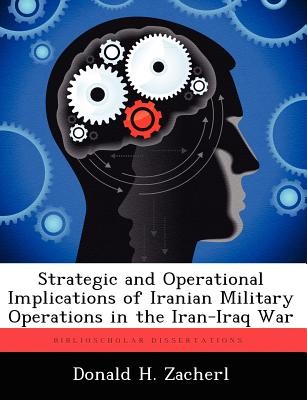
- We will send in 10–14 business days.
- Author: Donald H Zacherl
- Publisher: BiblioScholar
- ISBN-10: 1249250129
- ISBN-13: 9781249250128
- Format: 18.9 x 24.6 x 0.6 cm, minkšti viršeliai
- Language: English
- SAVE -10% with code: EXTRA
Strategic and Operational Implications of Iranian Military Operations in the Iran-Iraq War (e-book) (used book) | bookbook.eu
Reviews
Description
The progress of the Iran-Iraq War has surprised analysts. In order of gain insight into events in the region and their implications, I propose an analytical framework using Carl Von Clausewitz and Martin Van Creveld, which is used to analyze the military worth of the Islamic Iranian Army. The thesis has three logical steps leading to the eventual conclusion. First, the Imperial Iranian Armed Forces were fundamentally flawed. From its inception under Reza Shah, the people, army, government trinity had fatal cracks throughout. Muhammed Reza Pahlavi, attempting to build on the same structure, increased the pressure on the people, army, government trinity, resulting in a collapse. The weaknesses of this trinity was demonstrated by the patent inability of the army to defeat the revolution in spite, or even because of, the lavish augmentation of equ1pnient. Second, the Islamic Iranian army proved to have remarkable power and resilience in the Iran-Iraq War. Surprised by a powerful invader, hampered by desertion, eroding equipment, and unreliable logistics, the Iranian Armed Forces resisted the attack and went on the offensive. Actions were characterized by courage and fighting power, excellent staff work, and operational level planning. Third, the change in the Armed Forces was causally linked to the impact of the Islamic Revolution on the people, army, government trinity. The strong bond between Khomeini and the people, and the new army legitimacy and ethic, had a multiplicative effect on the military capability of the army.
EXTRA 10 % discount with code: EXTRA
The promotion ends in 23d.14:35:06
The discount code is valid when purchasing from 10 €. Discounts do not stack.
- Author: Donald H Zacherl
- Publisher: BiblioScholar
- ISBN-10: 1249250129
- ISBN-13: 9781249250128
- Format: 18.9 x 24.6 x 0.6 cm, minkšti viršeliai
- Language: English English
The progress of the Iran-Iraq War has surprised analysts. In order of gain insight into events in the region and their implications, I propose an analytical framework using Carl Von Clausewitz and Martin Van Creveld, which is used to analyze the military worth of the Islamic Iranian Army. The thesis has three logical steps leading to the eventual conclusion. First, the Imperial Iranian Armed Forces were fundamentally flawed. From its inception under Reza Shah, the people, army, government trinity had fatal cracks throughout. Muhammed Reza Pahlavi, attempting to build on the same structure, increased the pressure on the people, army, government trinity, resulting in a collapse. The weaknesses of this trinity was demonstrated by the patent inability of the army to defeat the revolution in spite, or even because of, the lavish augmentation of equ1pnient. Second, the Islamic Iranian army proved to have remarkable power and resilience in the Iran-Iraq War. Surprised by a powerful invader, hampered by desertion, eroding equipment, and unreliable logistics, the Iranian Armed Forces resisted the attack and went on the offensive. Actions were characterized by courage and fighting power, excellent staff work, and operational level planning. Third, the change in the Armed Forces was causally linked to the impact of the Islamic Revolution on the people, army, government trinity. The strong bond between Khomeini and the people, and the new army legitimacy and ethic, had a multiplicative effect on the military capability of the army.


Reviews